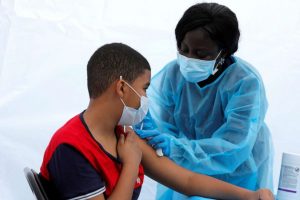CDC panel to discuss myocarditis reports in young people after COVID-19 vaccines

A CDC advisory panel is set to convene in an emergency meeting next week to discuss reports of heart inflammation in adolescents who received the COVID-19 vaccine.
CDC says 226 confirmed cases of the condition, called myocarditis, have been reported in people under 30 who received the Pfizer or Moderna COVID-19 vaccines.
Myocarditis tends to be temporary and clears up with treatment and monitoring, but the CDC is analyzing these cases to see if there’s a link to vaccination.
Dr. Tom Shimabukuro of the CDC’s Immunization Safety Office said there’s an “imbalance” in the number of cases but told an FDA advisory committee more details still need to be confirmed.
“The observed reports are exceeding the expected — based on the background, the known background rates that are published in the literature,” he told an FDA advisory committee this week.
“It’s a bit of an apples to oranges comparison, because again, these are preliminary reports. Not all of these will turn out to be true myocarditis or pericarditis reports,” he added.
More than 800 unconfirmed cases of heart problems were reported to the vaccine safety monitoring system, but the CDC says it’s most concerned about people under age 30. In that age group, the agency says it saw higher-than-usual numbers of myocarditis and pericarditis, with 226 confirmed cases. The CDC advisory committee will get an update on those reports at the meeting next week.
The CDC still recommends everyone over 12 get vaccinated against COVID-19 but says anyone experiencing chest pain, shortness of breath or rapid heartbeat within a week of being vaccinated should seek medical attention.
While the side effect is still considered rare out of the millions of people who have received the vaccines, the number is higher than the amount of people expected to develop the condition in the general population, which is why the agency and outside experts are looking closely to determine if there could be a connection to the vaccine.
Independent experts that advise the CDC and FDA are considering questions about the risks and benefits of making vaccines available to kids. They want to ensure that even as the country wants to vaccinate more of the population to reach herd immunity, there is enough data to ensure the benefits of vaccination outweigh any possible side effects.
The conversations and ongoing research will balance the risk to children from contracting COVID-19, including an illness called MIS-C, from the possibility of more severe side effects from the vaccine.
Clinical trials have found the COVID-19 vaccines are safe and effective against the virus in adults. Pfizer’s vaccine is currently authorized for children 12 and older after a clinical trial found it was safe in teens. Experts say there is no reason vaccines would impact puberty or fertility.
Meanwhile, studies testing Pfizer and Moderna vaccines in children younger than 12 are currently ongoing, and expected to have data available by the fall. Advisers to the FDA said this week that despite the urgency to reach herd immunity, there’s no reason to rush the trials in young children.
The CDC advisory committee is not expected to vote on any changes to vaccine recommendations or the timeline for when COVID-19 vaccines could be approved for kids but will discuss what additional data is needed to determine if myocarditis reports are related to the vaccines.
ABC News’ Sony Salzman and Sasha Pezenik contributed to this report.
Source: Read Full Article
